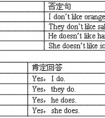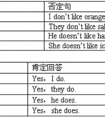改错。( ) 1. JuststayonbedandI'lltelephonethedoctor. _________________ A B C( ) 2. You'dbettertogotothehospital. _________________ A BC( ) 3.Howmanyfishes-六年级英语
Miss Lucy came to China by air. 露西小姐是乘飞机来中国的。
(5)for为……,因为……,至于……。
He works for this company. 他为这家公司工作。
She came back to the classroom for she had lef the books in the class room. 她返回到教室是因为把书留在了那里。
(6)from从……,来自……,因为……
Where are you from? 你是哪里人?
He diedf rom an accident. 他死于一场事故。
(7)of……的,属于……
This is a map of China.这是一张中国地图。
(8)with使用、和……在一起
We write with a pen. 我们用笔写字。
Can you go to the park with me? 你能和我一起去公园吗?
注意:在last, next, this, that, some, every 等词之前一律不用介词。如:We meet every day.
小学常见介词:
1.on
(1) 在------上面 The book is on the desk.
(2) 在------(哪一天/星期)What do you do on Wednesday?
(3) 在------(月、日)My birthday is on August 2nd.
2. in
(1)在------里面 The pens are in the pencil-box.
(2)在------(哪一年/月)His birthday is in October.
He worked here in 1992.
(3 ) 在------(地方) He works in Dongguan.
(4 ) 在------之内 What are you going to do in 20 years?
(5 ) 在------(早上、下午、晚上)
I do morning exercises in the morning every day.
I usually play basketball in the afternoon.
I often do my homework in the evening.
3. under
在------底下 There is a ball under the bed.
4. near
在------附近 There is a book shop near our school.
5. in front of
在------前面 A boy is standing in front of the house.
6. beside
在------旁边 A football is beside the door.
7. next to
紧挨着 There is a bus station next to No. 13 Middle School.
8. over
在------正上方 A bridge is over the river.
9. on the left
在------左边 The bookstore is on the left.
10. on the right
在------右边 The hospital is on the right.
11. before
在……之前 Mike sits before me.
12. after
在------以后 He went home after school.
13. in the middle
在------中间 The road is in the middle.
14. at
(1) 在------(小地方) I am at school today. I was at home yesterday.
(2) 在------(点钟) I usually go to school at 8:00 am.
(3)看一看 Look at the blackboard.
(4) 在中午 at noon
15. behind
在------后面 There is a broom behind the door.
16.for
(1)给 This present is for you.
(2)为了 Thank you for telling me the way to the zoo.
(3)作为 We have some chips and hamburgers for lunch.
17.to
(1) 到 Take your sport shoes to the P.E class.
(2) 致 Happy birthday to you. Give it to your friend.
18. from
来自 I am from China. = I come from China.
19. from --- to
从------到------ Line up from shorter to taller.
We have class from Monday to Friday.
20. of
------的 He is a student of Kama School.
21. by
(1)在------之前 We must be at home by 6 o’clock.
(2)乘------交通工具 People can go to the moon by spaceship.
I go to school by bus.
22.with
(1) 用 I write a letter with a pen.
(2) 和------一起 He went to Shenzhen with his parents.
23. between
在------与------之间 There is a football match between Class One and Class Three.
24. into
到------里 Sharks can dive into the deep cold water.
25. like
(1)象------ The twins are like their father.
(2)长相------怎样? What’s he like?
26. up
向上 Put up your hands if you have any questions.
27. down
向下 Put down all the books here.
28. about
(1) 大约;关于 It’s about 6:00 now.
(2) ------怎么样? What about---? How about---?
29. what for
为什么 But what for?
早、午、晚要用in,at黎明、午夜、点与分。
年、月、年月、季节、周,阳光、灯、影、衣、冒in。
将来时态in...以后,小处at大处in。
有形with无形by,语言、单位、材料in。
特征、方面与方式,心情成语惯用in。
介词at和to表方向,攻击、位置、恶、善分。
日子、日期、年月日,星期加上早、午、晚,
收音、农场、值日on,关于、基础、靠、著论。
着、罢、出售、偷、公、假,故意、支付、相反,准。
特定时日和"一……就",on后常接动名词。
年、月、日加早、午、晚,of之前on代in。
步行、驴、马、玩笑on,cab,carriage则用in。
at山脚、门口、在当前,速、温、日落、价、核心。
工具、和、同随with,具有、独立、就、原因。
就……来说宾译主,对、有、方状、表细分。
海、陆、空、车、偶、被by,单数、人类know to man。
this、that、tomorrow,yesterday,next、last、one。
接年、月、季、星期、周,介词省略已习惯。
over、under正上下,above、below则不然,
若与数量词连用,混合使用亦无关。
beyond超出、无、不能,against靠着,对与反。
besides,except分内外,among之内along沿。
同类比较except,加for异类记心间。
原状because of,、 owing to、 due to表语形容词
under后接修、建中,of、from物、化分。
before、after表一点, ago、later表一段。
before能接完成时,ago过去极有限。
since以来during间,since时态多变换。
与之相比beside,除了last but one。
复不定for、找、价、原,对、给、段、去、为、作、赞。
快到、对、向towards,工、学、军、城、北、上、南。
but for否定用虚拟,复合介词待后言。
ing型由于鉴,除了除外与包合。
之后、关于、在......方面,有关介词须记全。
in内to外表位置,山、水、国界to在前。
考点名称:集合名词
- 集合名词:
是语言学上的一个专有名词,意指一种可用来指称一群对象的词语,而这些对象,可以是人、动物、或是一群概念等事物。(family、people)
举例而言,在英语中,“一群狮子”可称为“aprideoflions”,此时“pride”为一个集合名词。 - 集合名词分类及用法特点:
第一类
形式为单数,但意义可以用为单数或复数这类集合名词
包括family(家庭Y: 'Times New Roman'">family(,team(队),class(班),audience(听众)等。
其用法特点为:
若视为整体,表示单数意义;若考虑其个体成员,表示复数意义。
比较并体会:
His family is large. 他的家是个大家庭。
His family are all waiting for him. 他的一家人都在等他。
This class consists of 45 pupils. 这个班由45个学生组成。
This class are reading English now. 这个班的学生在读英语。
第二类
形式为单数,但意义永远为复数这类集合名词
包括cattle(牛,牲畜)cattle(,people(人),police(警察)等。
其用法特点为:
只有单数形式, 但却表示复数意义,用作主语时谓语用复数;不与 a(n) 连用,但可与the连用(连用)。
如:People will laugh at you. 人们会笑你的。
The police are looking for him. 警察在找他。
Many cattle were killed for this. 就因为这个原因宰了不少牲畜。
注:表示牲畜的头数,用单位词 head(单复数同形)。如:five head of cattle 5头牛,fifty (head of ) cattle 50头牛
第三类
形式为复数,意义也为复数这类集合名词
包括goods(货物),clothes(衣服)等。
其用法特点是:
只有复数形式,当然也表示复数意义,用作主语时谓语也用复数),但通常不与数词连用。
如:Clothes dry slowly in the rainy season. 衣服在雨季不易干。
Such clothes are very expensive. 那样的衣服很贵。
If goods are not well made you should complain to the manufacturer. 如果货物质量不好,则理应向制造商提出控诉。
第四类
形式为单数,意义也为单数这类集合名词
包括baggage / luggage(行李), clothing(衣服), furniture(家具), machinery(机器), poetry(诗), scenery(风景), scenery(), jewelry(珠宝), equipment(设备)等。
- 最新内容
- 相关内容
- 网友推荐
- 图文推荐
| [家长教育] 孩子为什么会和父母感情疏离? (2019-07-14) |
| [教师分享] 给远方姐姐的一封信 (2018-11-07) |
| [教师分享] 伸缩门 (2018-11-07) |
| [教师分享] 回家乡 (2018-11-07) |
| [教师分享] 是风味也是人间 (2018-11-07) |
| [教师分享] 一句格言的启示 (2018-11-07) |
| [教师分享] 无规矩不成方圆 (2018-11-07) |
| [教师分享] 第十届全国教育名家论坛有感(二) (2018-11-07) |
| [教师分享] 贪玩的小狗 (2018-11-07) |
| [教师分享] 未命名文章 (2018-11-07) |


![Where is my bag? It's _____________the desk. [ ]A. inB. behindC. on-五年级英语](http://www.00-edu.com/d/file/ks/4/1/44/2019-08-20/small3591750882d019139d20d416cb80f64f1566236486.jpg)
![Where's my pen? [ ]A. It's in the desk.B. It's under the desk.C. It's on the desk.-四年级英语](http://www.00-edu.com/d/file/ks/4/1/44/2019-08-20/small4157828d9d6bc1a02bdbdd4d3ffccde61566236790.jpg)

![I can call you _____________ the phone.[ ]A. inB. atC. onD. of-六年级英语](http://www.00-edu.com/d/file/ks/4/1/44/2019-08-20/small17adfe158040ebb20380cac1c81e7ec81566232881.jpg)
